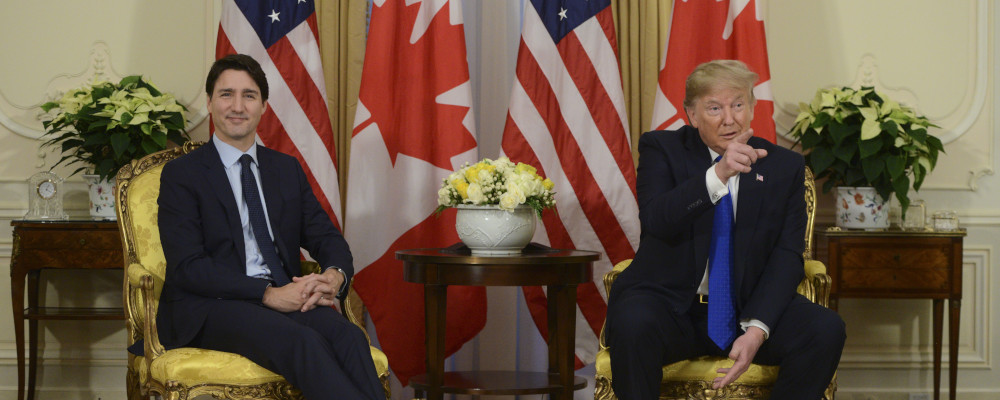The thing about history is you never know when you are.
It’s not like geography, where you can pull up a map and see how far it is to your destination. With history, if you’re lucky you know where you came from, but never what lies ahead. You don’t even have a destination.
Because it can be disorienting not to know what the future holds, we have developed theories to impose the illusion of order: Giambattista Vico’s cyclical ages, Marx’s scientific socialism, the Whig interpretation of history, and countless other more and less plausible systems of thought invented to deny that history is “just one damned thing after another.”
The Hub’s inaugural editorial doesn’t fall into this deterministic trap, thank goodness. Quite the opposite — it practically fizzes and pops with optimism. It laughs at decay and blows raspberries at entropy. “The future is not some autonomous force that unfolds according to its own logic,” the editors aver, and “a different and better future is indeed within our reach if we have the foresight and discipline to make the right choices.”
It’s all so effervescently hopeful that I almost wish it were true! I too want to be one of the “agents of the future” when I grow up, and maybe by then I will figure out what it means. I kid. It’s a splendid and spirited statement and I’m glad to see the Hub, like National Review’s mission statement 66 years ago, “start with a considerable — and considered — optimism.”
It’s just that I’m not by nature an optimist, at least not in the long term. Ask me what’s for lunch and my mind will race away imagining all manner of delights, but ask me about the future and I’m a cheerful pessimist. Trollope wrote that “[t]he well-educated, widely-read Conservative, who is well assured that all good things are gradually being brought to an end by the voice of the people, is generally the pleasantest man to be met.” That has been my experience too, and I hope one day to illustrate the point.
For better or for worse, bravado is not the Canadian way.
Like my esteemed editors, politicians, alert to the rhetorical potential of the unknown, also like to assure us that our best days lie just ahead. There will be a brighter tomorrow, if only we choose and trust them. So, they quote John Diefenbaker, who kicked off the 1957 federal campaign by thundering: “My friends, this is a time for greatness in planning for Canada’s future. Unity demands it; freedom requires it; vision will ensure it.”
I wonder how many of Diefenbaker’s audience in Massey Hall that night remembered Wilfrid Laurier’s assurance to an almost identical crowd in the same venue half a century earlier: “Let me tell you, my fellow countrymen, that all the signs point this way, that the 20th century will be the century of Canada.”
Even allowing for both poetical and political license, both Diefenbaker’s and Laurier’s prediction were optimistic, but they weren’t entirely wrong either. The twentieth century did treat Canada pretty well, but we shouldn’t give politicians much of the credit. Nor should we take much credit ourselves as a country. Our real good fortune was to live next door to the country to whom the century undoubtedly did belong.
As the omphalos of cultural power crossed the ocean from London to Washington after the Great War, Canada’s cultural fortunes pivoted accordingly. Canadians, who had benefited from being preferred partners of one global hegemon, quickly adjusted to basking in the reflected glow of another.
We were fortunate on both accounts — so fortunate that we usually take it for granted.
Never before had so much of the world been so orderly, so wealthy, and so secure, and never before had a country been more fortuitously located in time and place. I once heard Benjamin Netanyahu compare Israel’s and Canada’s respective positions: Israel, he said, was bordered by three hostile powers and an ocean, while Canada was bordered by three oceans and the friendliest of neighbours. He was right: we have been spoiled, and we should not forget it.
Nor should we forget that none of this was foreordained. A wealthy heir is just a lucky sperm, and Canada has been a happy accident of history and geography.
However much earlier generations of Canadians resented English snobbery even as they emulated it, and however much we now disdain American commercialism while consuming it by the gigabyte, we should always remember our peripheral and dependent relationship to both. We are not Rome; we are cisalpine Gaul.
We were birthed by British industry and came of age alongside America. The United States used to be naïve about the wider world, but fascinated by it, and the world looked to Canada as a trusted and sometimes influential interpreter of the new superpower. Now, as American attention turns inward and it expends more energy on internal division than on outward expansion, we feel our true impotence. We shared in the optimism of America’s post-war boom; now we are yoked to a stagnant American civilization and infected by its pathologies.
Stagnation is worse than decline. If we knew that the end were truly nigh, we could unleash ourselves in a Dionysian frenzy of self-forgetting or we could repent our sins and achieve a sublime grace. Instead, we are trapped, not knowing what comes next or even if there is a next and not just more of the same, on repeat, until we hit a civilisational cataclysm: the next and worse plague or Great War.
The marriage of technology and mass commercial culture, two more dividends of our American partnership, contributes to this experience of stagnation and traps us there with them. The internet on our phones, our televisions, our computers, and in our smart homes surrounds us with an infinite archive at our fingertips that means nothing is ever left behind and our next experience is more likely to be a re-run than something genuinely new.

We have become cultural hoarders, mentally boxed in by stacks of old movies, old music, old news clips, most of it not of our making. An episode of Frasier from 1995 or The Office from 2005 or the latest episode of The Bachelor: it’s all “on demand.” The instant availability of everything means we don’t have to move on culturally, so we don’t; we just accumulate more content, all of it equally accessible all the time.
The effect is flattening and sterile. A stagnant age is an age of revivals, franchises, and sequels. The appearance of something new usually turns out to be, on closer inspection, just an illusion of embellishment and filigree, a variation on an old theme, a reinterpretation of culture rather than its advancement. A teenager in Fresno making a dance remix of last year’s Taylor Swift hit may be inventive, but that’s not the same as invention.
What Mark Fisher described as “the slow cancellation of the future” in popular music now applies in all areas of life. Even politics. What are the latest political trends? Socialism, anti-fascism, political correctness — pastiches of once vital ideologies. Past and present blur, and the future never arrives, it just merges into a limbo of permanent past-present. We are stuck in time.
So where does that leave us, we aspiring agents of the future? Or, rather, when does that leave us?
We should start by lowering our expectations of what is possible. In his recent memoirs, Barack Obama offered a surprisingly bleak prognosis for America. Writing about former Indian Prime Minister Manmohan Singh, Obama says that:
“Like me, he had come to believe that this was all any of us could expect from democracy, especially in big, multiethnic, multireligious societies … [j]ust the observance of rules that allowed us to sort out or at least tolerate our differences, and government policies that raised living standards and improved education enough to temper humanity’s baser impulses.”
Given the political polarisation and social disintegration now engulfing America, we may be lucky if the future is that good. The alternative is much worse, and at least equally likely.
We are free to think small but beautifully and not worry about what we can’t control.
Two years ago, Emmanuel Macron told the assembled ambassadors to France: “We know that civilizations are disappearing; countries as well. Europe will disappear.” When was the last time you heard anything like that from a Canadian politician? Can you imagine a prime minister saying: “Canada is a wonderful place to live, but one day it will end. We don’t know how or why or what will replace it, but we know for certain that it will.” Poor Diefenbaker would spin in his concrete-reinforced grave.
Macron’s conclusion was that, facing “obliteration,” France must adopt “a strategy of boldness, of risk-taking.” He boasted that “the French spirit is a spirit of resistance with a universal calling,” a calling to “humanism” that means “we can make things happen.” It is hard not to smile at such Gallic chauvinism or to admire its audacity — “toujours de l’audace!” as Danton insisted. And maybe he is right that a riven continent can rally around a common cause — even something as hollow as humanism, which Macron deflatingly called a project centred on “man with a capital M” — but I doubt it. It sounds more like the bravado of desperation.
For better or for worse, such bravado is not the Canadian way. Even if we want to be bold, we can only be bold in the margins of the history books. And that is nothing to regret. We have a good patch of earth here, blessedly dull and usually just about well-enough run by just about good-enough leaders. We are free to think small but beautifully and not worry about what we can’t control. We can still tend our garden, and wait to see what the calendar brings for Rome and our allied province.
This could be mistaken for a counsel of complacency, but it’s not. Any gardener will tell you that cutting and pruning and keeping the weeds at bay is full-time work, and a well-kept garden brings great joy and sustenance. I don’t object to the vaulting ambition of The Hub’s editors, it’s just that my ambition differs in scope and scale. I certainly agree with them that “[a]n aggregation of our individual and collective choices will ultimately shape the society that subsequent generations inhabit.” I just prefer to focus on those individual choices and let the fruits of aggregation follow — or not.
Let civilizational battles rage elsewhere; we can’t stop them. If we tried really hard collectively, we might be able to filter out some of the worst American tendencies — the politicisation of our private lives and the pornographication of our culture — but there is no stomach for that fight among the people and our leaders have already surrendered. A blended mass culture means what happens on American streets also happens in our living rooms, and our corporate, academic and media elites seem hell bent on misdiagnosing here the same problems that are tearing our neighbours apart, and prescribing the same radical interventions.
In the end, there is no science to human history, and thus no knowing when we are. Canada’s fortunes rose with the British Empire and were carried along for a time by American cultural imperialism; now we face their fates. Whatever that will be, it will be our fate too.
To borrow a conceit from the almost-great Canadian novel: we’re Fifth Business. Ultimately it doesn’t matter that we cannot know when we are in history, because we are not the heroes of the story.
Recommended for You

Canada needs an effective fighting force, not another boondoggle

The one big takeaway from François Legault’s resignation: The Weekly Wrap

Forget becoming the 51st state—Canada needs the Turks and Caicos to become its 11th province

‘This is a national interest matter’: The case for a new pipeline just keeps getting stronger





Comments (0)